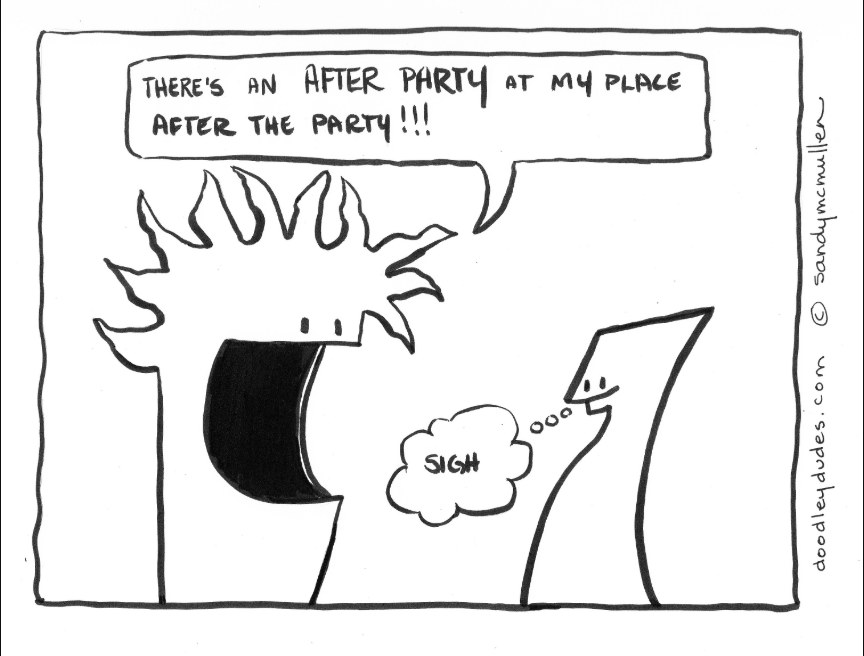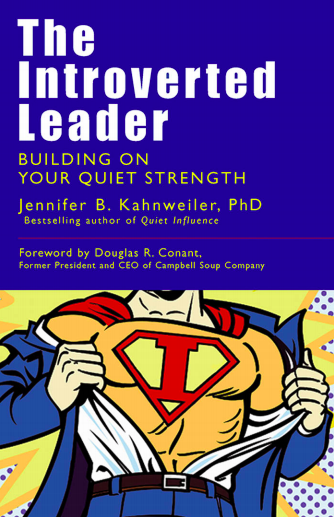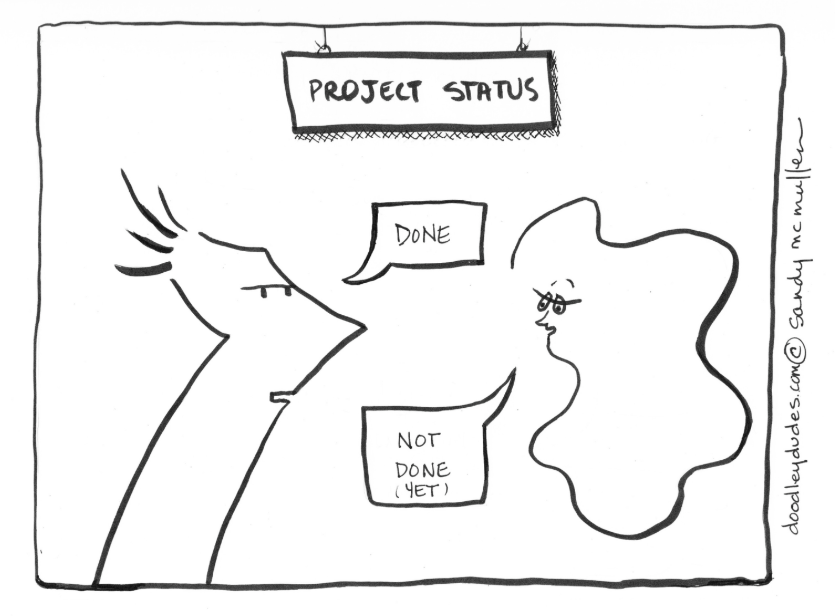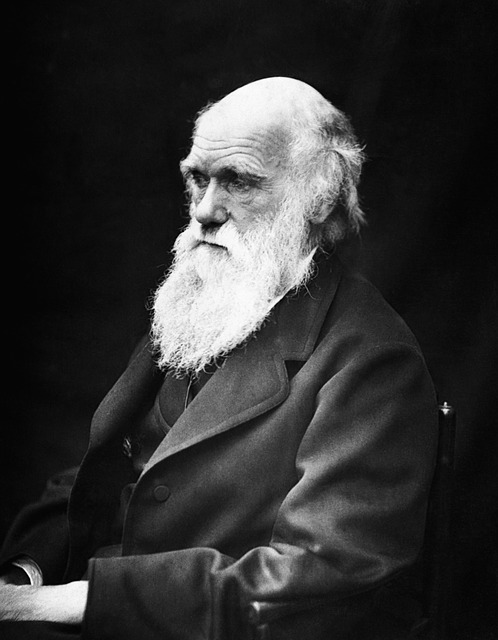
by Sandy | Feb 12, 2018 | MBTI Facts
Which one of these is you? Do you leave a party or seminar looking for what’s next or are you quite ready to go home?
One of the first MBTI trainers that I had is a vivacious, energetic presenter. Many people assume that she has a preference for Extraversion but in fact her preference is for Introversion. People are often attracted to the trainer and have questions that they want answered so the person presenting is literally front and center from the moment they walk in the door until the moment they leave. This can be a challenge for everyone but especially for the Introvert who would do well to plan for lunch alone. “Can I buy you lunch?” may seem like “Can I pick your brain and leave you on empty?”
Extraversion and Introversion refer to where an individual gets their mental energy. Because the Extravert gets it from the external world of sights, sounds and people they are fed by a party or other social event and want more. The Introvert on the other hand while fully engaged during the event finds the internal world of reflection energizing. After the party they are ready for some “alone” time.
The Extravert will also eventually reach a point where they need to retreat from the outer world to regroup.
Do you recognize yourself in either character in the doodle?

by Sandy | Feb 11, 2018 | MBTI Facts
An article by this title (Why Introverts Can Make the Best Leaders) was posted at Forbes.com. Jennifer B. Kahnweiler author of a book on how Introverts can leverage their strengths to become great leaders gives five valuable considerations in her article. They include the value Introverts provide in
- how they think before talking,
- how they are drawn to deeper more meaningful conversation,
- how the reassuring calm that is natural to them helps others,
- how they readily make use of the power of the written word, and
- how they take time to refuel their thinking, creativity and decision making.
It is a short article that is a teaser for what looks like a very worthwhile book. The Introverted Leader: Building on Your Quiet Strength
It is well worth 3 minutes of your time in popping over to read this article in full.
A mention I made of this article on Facebook sparked a conversation about the “below the radar” aspect of the power and strengths of many with a preference for Introversion in organizations. A couple of coaching/consulting colleagues shared their experience regarding the number of clients they had who they recognized as being quiet “stars”. The question then is how to work with your preferences to let your light shine.
Kahweiler’s article at one point talks about the use of Social Media tools to make the strengths of the Introvert more visible to others. Creative, inspiring and practical approaches to help make use of all ones gifts and talents in the workplace – now that sounds like a winner to me.

by Sandy | Feb 10, 2018 | MBTI Facts
Those 4 letters that make up your MBTI type are a code to how those preferences interact. The J and P (Judging and Perceiving) refer to how you operate in the world J’s preferring the decision making functions of Thinking or Feeling.
The MBTI types with J in their code want to make a decision after sufficient information has been gathered. Once the decision has been made they are often “early starters”. They love to check things off their “to do” list.
Those who have P in their code want to defer making a decision and to continue to gather information. From their perspective new information will alter the whole decision. A Jesuit scholar once told me that the Latin root of the word decide meant “to kill off”. Imagine killing off all those delicious possibilities by deciding on just one of them.
My personal experience is that there is something about adrenalin for the P. I can try for the life of me to start early but there is no “juice” and I can’t see the path. A deadline charging toward me creates focus and clarity. So I make the deadline – sometimes by the skin of my teeth but I make it.
BTW -this can be the source of conflict in the workplace and on vacation with friends – I’ll bet you have a story to share.

by Sandy | Feb 9, 2018 | Personal Expression
It is almost 10 years passed the 200th anniversary of the birth of Charles Darwin. I was aware of it but hadn’t given it any particular attention until I was inspired to do some reflecting by an interesting exchange on Twitter.
Ken from NYC aka @holymully “Your only obligation in any lifetime is to be true to yourself.” – Richard Bach (my quest indeed – why is it a challenge?)
holymully @sandymcmullen The challenged to being yourself is explained in Darwinian terms as “survival” games. 2 be real self threatens survival
I don’t know that I have reached any conclusions even though I have been mulling this over for a few days nevertheless here is what I have “found” so far.
I suppose we can get closer to being our real selves when we are relaxed and have no demands impinging on us from the external environment. These occasions may happen at times such as vacation. When there are no demands from the external world being ourselves may be more closely aligned with our “real” or natural state.
Darwin observed the Natural world in order to identify and record the characteristics that allowed species to survive in different environmental conditions. As environmental conditions change the species with the characteristics that increase their chances for survival remain while other species fail to survive.
In the struggle for survival, the fittest win out at the expense of their rivals because they succeed in adapting themselves best to their environment
The natural world as we know it in our daily lives has many dimensions – environmental, economic, social and emotional. There are certain personality types that are naturally hardy and can adapt to upheavals in circumstances in a timely manner. They are resilient and bounce back from whatever shifting circumstances happen to dish up. This naturally hardy type may be more the exception than the norm.
In this current economic downturn: for example, many people are feeling at risk. They feel pressure to adapt their behaviour, their beliefs indeed their very sense of themselves. If they don’t adapt they may not survive and questions like “who am I really” become secondary to questions like “how am I going to feed my family?”.
The one thing that we can count on is that things do not remain static. Change is inevitable whether it is positive or negative.
I would like to suggest that we do not need to give up who we are in order to survive. Yes we may need to make changes in the way we do things but we have resources and capabilities to design an approach that is ecological to the larger system and to our own integrity. Before we know where we need to adapt we need to have a realistic picture of “what is” – the reality of the moment. We also need to know who we are (our strengths and our limitations) in order to know where we need help.
Darwin observed and observed in order to know the true nature of the natural world. In order to know our true nature, we can focus on becoming better and better at being observers of the flow of our moment to moment reality. Not everyone is committed to the rigor of this way of knowing ourselves. Employing a selection of personality assessment tools ssuch as the MBTI , the Enneagram or the Reiss desire Profile can help provide a lens to support our journey toward self knowledge.
The clearer I am about what I can do and cannot do the clearer I can be about what next steps I need to take. In the world of flora and fauna “natural selection” may prevail. We have the opportunity to use whatever wisdom we have in order to be intentional about how we interact while still respecting that we are part of a living system. Indeed, the paradox of knowing and accepting our limitations and reaching out to others to get help may be just the thing that makes room for adaptation (transformation) to occur.
Here’s a thoughtful response to this post:
Hey Sandy:
Sorry it’s taken so long to respond but its been one of those months of deep introspection for me – inspired, in part, by your post. (Thanks for the rest of your gifts that provoked reflection this year too, btw)
As a Virgo with a Thinking preference, being analytical and ‘knowing oneself’ is very important. I subscribe completely to the notion that “the unexamined life is not worth living”.
Knowing oneself is one thing, however being ‘true’ to oneself, as you so rightly point out, is a challenge. Environmental conditions (economic, social and emotional) often pressure us to change in order to survive. How can we do that with integrity? How can we adapt with awareness and knowledge and yet stay “true to ourselves”?
I think the crux lies in understanding ourselves as ever evolving, ever adapting organisms. In Darwinian terms, we’re not far out of the trees physically but socially we’ve made considerable “progress”. As emotional beings, on the other hand, we still have some considerable way to go, imho.
Our emotional life often leaves us with a bunch of past experiences through which we filter current events – we accumulate insecurities and fears and needs etc. that inform our perception of “reality”. Often we recognize that the feelings we experience aren’t rational but sometimes they’re so intense, they’re hard to deal with. The temptation is to throw our hands up and say, ‘That’s who I am’ – as if capitulating to our fears and insecurities is somehow a display of integrity. It’s nothing less than an abdication of responsibility to do the hard work. In that sense, I think we need to give up “who we are” in order to survive (not physically but mentally, emotionally, spiritually)
For me, the key is to acknowledge that between stimulus and response; we have a choice. It is within our power to change our emotional response to a situation. It’s not easy; it takes effort but as you point out “we have the opportunity to use whatever wisdom we have in order to be intentional about how we interact while still respecting that we are part of a living system”
Finally, thanks Sandy for your gentle guidance and mindful mentorship.
hugs
John

by Sandy | Feb 9, 2018 | MBTI Facts
Getting to know who we are ought to be easy. We look at ourselves in the mirror everyday. That only gives us a snapshot or perhaps a delusion if we think that is all there is. Using the MBTI as a tool for gaining self knowledge is an excellent choice, but as my response to this reader’s request illustrates it isn’t always accomplished with a first glance.
Can you do an article about ENFP and INFP differences?
I’m NFP but don’t know whether E or I.
(To make things more complicated I’m Enneagram 3 which is externally focused, so it is confusing me.)
When people first meet the MBTI model, they often look at it as a collection of preferences. So they try to decide am I really “Extroverted” or am I more “Introverted”. The four letters that make up the MBTI type are really a code that determines how the four functions of Intuiting, Sensing, Thinking and Feeling interact. This means that a person with preferences for INFP has a different dominant or leading function than a person with ENFP preferences. I sometimes think of dominant function as a persons first language. While we use all functions they are not all used equally and this flavours how we show up in the world.
The INFP leads with Introverted Feeling. They approach life looking through a lens of what is important and what is of value in a universal context. They can see the subtle differences in a constellation of factors such as the relative value of all the component parts involved – the various groups, the individual people, their actions, the beliefs and thinking underlying the issue. All of this is measured against their own inner value system to see what is in alignment and what isn’t.
The INFP “loves” the authentic in people and draws that out in them. Integrity, harmony, values and identity are words that resonate with the INFP. They are interested in what is deep and meaningful to the individual and they are not interested in people who don’t live up to their ideals.
On the other hand ENFPs lead with Extroverted Intuition. Having this dominant function is like having radar for the unspoken, the random occurrences surrounding a situation and a sudden knowing of what it all means. Brainstorming is like oxygen and the ENFP floats possibilities out to see which ones will rise to the top. They often follow several tangents at once without attachment and this ability allows them to navigate change as part of exploring life.
The ENFP is an inspiration junkie and wants to inspire and be inspired. They are known for their enthusiasm but have to watch to temper their enthusiasm with reality.
Your Dominant Function
Again it comes down to how do you know? The best way is always to combine taking the MBTI assessment tool through a certified practitioner combined with the coaching they will offer to do a self- determination of type.
I also recommend getting curious over a period of time and becoming a detached observer of your behaviour. On a personal note- even though I spend oodles of time alone and have become less and less social over time – the ENFP dominant function of Extroverted Intuition stands out a mile. Not only do I experience it I hear feed-back from others that this is what they experience too. At the same time I know that while I appreciate deep meaningful conversation I have no interest in sustaining that in the same way an INFP can and does.
The Step 2 Distinctions
To go back to the attitudes of Introversion and Extroversion for a moment. When I use the MBTI, I prefer the Step 2 inventory which breaks down each of the preference pairs into 5 sub-pairs.
People may be out-of-preference on one side of the equation that differs from their type code and this not only adds a layer of complexity but also explains a lot.
One individual who stands out had results that said he was ENTP but he was out-of-preference on the Introverted side for 2 of the 5 distinctions for Extroversion and Introversion. He determined that INTP was a better fit for who he was and how he operated in real life. The team that reported to him also gained an understanding of how to best communicate with him. They could see that he “went to his cave” literally and figuratively at times and yet he would respond when asked so that they had permission to ask.
Also I have seen it work that understanding potential out-of-preference distinctions allowed the person to be really comfortable with their MBTI results and yet fit in this seemingly confusing aspect of their behaviour. One person who typed as an Extrovert was out-of-preference for one of the 5 distinctions on the Introverted side. He was able to explain to his team that there were times were he felt quite shy. The team members confessed that they had experienced this and felt that understanding this distinction helped them not to take this shift in behaviour personally.
As for the Enneagram
Each of these personality tools needs to be first looked at on their own before trying to see how they work along side each other. They do not readily overlap in all places and even so experts do not agree on how they do. My ENFP preferences are not typical for an Enneagram 6 but make sense to me when I see my strong 7 wing.
My suggestion is to look at these 2 tools as separate entities for now. The Enneagram is not a fast study IMHO so be okay with being curious. You are simply fascinating and worth the time investment to explore.
I’d love to hear if this helped you come to a landing place and also love to hear how others resolve MBTI type confusion.





